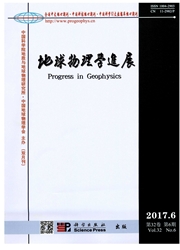

 中文摘要:
中文摘要:
沥青心墙是水利水电工程的一种重要的防渗形式,其质量直接关系到工程的安全.压实度是评价其质量的重要指标,常采用取芯后实验室来测定,虽然探测结果可靠,但破坏性大、周期性长以及连续性差.我们采用探地雷达方法来评价沥青心墙的压实度.为消除沥青心墙的侧壁和两侧的堆石对探测结果的影响,本文模拟了雷达波在沥青心墙中传播,得出没有侧壁和堆石反射波影响的有效探测深度.并利用实测数据提取沥青心墙的雷达波属性如振幅、主频以及瞬态谱等,结合采样获得的孔隙度和密度,得出其与属性参数间的关系.研究表明,这种方法可以直观、快速、连续的反映心墙压实度变化,为工程质量的检测提供很好的依据.
 英文摘要:
英文摘要:
Asphalt core-wall is an important form for seepage control in water resources and hydropower engineering and its quality directly relates to the safety of engineering. The conventional evaluation meth- od is sampling and detecting in lab. Its advantage is reliability and its disadvantages are destructiveness, 1- ong periodicity and discontinuity. So an effective method is of urgent need. Ground Penetrating Radar (GPR) has the advantages in non- destructive, rapid and high accuracy. GPR can not detect core-wall of asphalt concrete very well now because the core-wall is very inhomogeneous and has strong reflected waves of both sides of the int- erface. We simulate the radar wave propagating in the core-wall and yield effective detect depth without effects f- rom rocks beside the asphalt. According to results of simulation, we get attribution parameters such as amplit- ude, phase and frequency from GPR data. We analyze the relationship between density and porosity of the sample and the parameters of attributions.Using this {ormula we can evaluate the project quality.
 同期刊论文项目
同期刊论文项目
 同项目期刊论文
同项目期刊论文
 期刊信息
期刊信息
